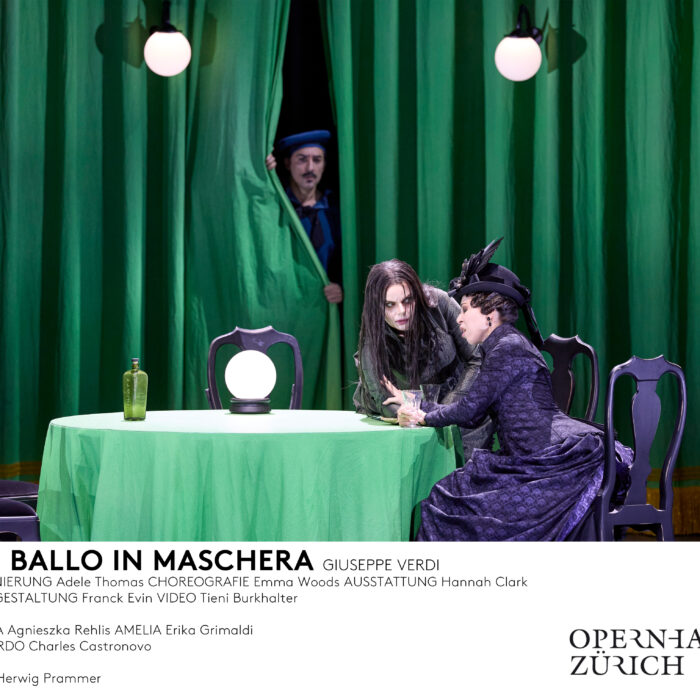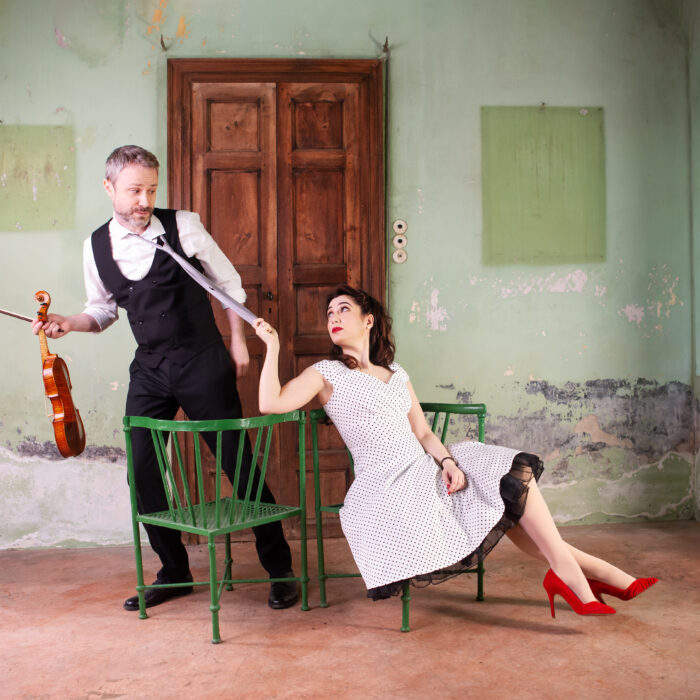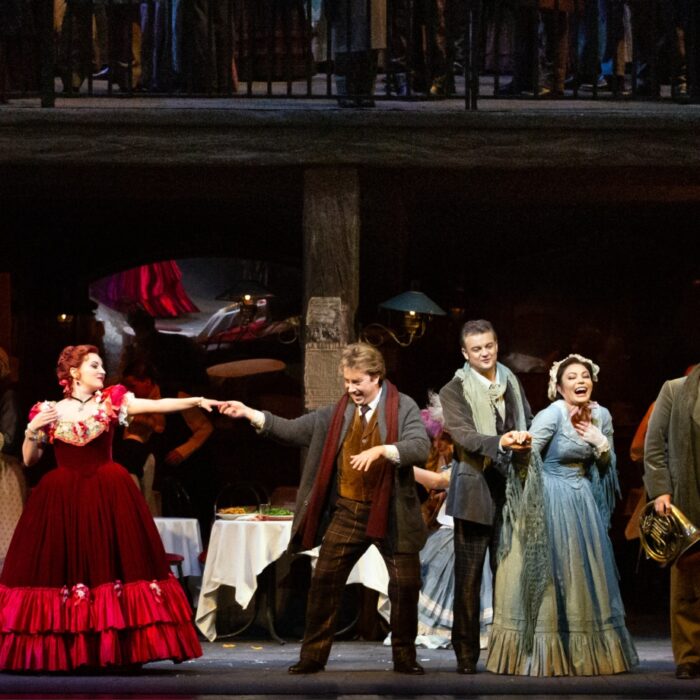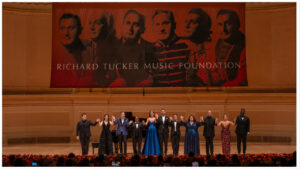
Richard Tucker Music Foundation 2023 Review: 48th Annual Gala Concert
By Logan MartellOn October 29, 2023, the Richard Tucker Music Foundation presented their 48th annual gala concert at Carnegie Hall. Over the decades, the foundation has provided support, training, and performance opportunities to some of opera’s most promising stars, many of whom have gone on to share their gifts with audiences around the world. This year’s concert saw a number of departures from past presentations due to almost just as many difficulties, yet the artists delivered a sonorous argument that the show must go on.
Opening the concert was a 1951 recording of Richard Tucker singing “Sound An Alarm” from Händel’s “Judas Maccabeus,” followed by remarks by his son, and current foundation president, Barry Tucker. Tucker acknowledged the financial difficulties which have resulted in the absence of the usual auditions and awards, as well as the piano accompaniment in lieu of an orchestra. He also expressed his gratitude to the Metropolitan Opera’s General manager Peter Gelb, the artists, and those who helped make the evening’s concert possible.
Continuing in the vein of unfortunate news was the announcement that soprano Angel Blue, winner of the 2022 Richard Tucker Award, had to withdraw from the performance due to illness. Earlier this week it was announced that tenor Matthew Polenzani withdrew for similar reasons, so this latest withdrawal came as quite the blow. Also slated for the evening was bass-baritone Christian Van Horn, who was unable to make it for reasons currently unknown at the writing of this article.
Stunning Soloists
First on the program was baritone Sean Michael Plumb, with “Largo al Factotum” from Rossini’s “Barber of Seville.” Accompanied by Howard Watkins, Plumb navigated the piece with charm and precision; his expressive facial and body language helped bring out the most of his rendition as they kept a brisk pace which highlighted Plumb’s diction and energy through the patter sections and shifting moods.
Next came soprano Angela Meade, joined by Bryan Wagorn for “Ebben? Ne andro lontana” from Catalani’s “La Wally.” Wagorn laid out the introduction with both a delicacy in the upper register which was contrasted by the underlying weight of its chords, suitably evoking the beauty and danger of the snow. Meade’s impassioned soprano filled not only this musical chasm, but the air of the auditorium with great ease as the two artists built with intensity that held the attention of everyone present before delivering the massive, ruinous conclusion as Wally resolves to throw herself into the ensuing avalanche, earning great applause.
Following this, Wagorn returned to the piano joined by bass Soloman Howard for “Il lacerato spirito” from Verdi’s “Simon Boccanegra.” Howard displayed a haunting gravity in his voice as he relayed the father’s broken heart amid the lower tumult of chords punctured by dissonant trills and creeping figures. This grief melted beautifully into a heartbroken prayer for his daughter’s repose as Howard repeated the closing lines with increasing affection.
Soprano Liv Redpath, joined by Watkins, performed “A vos jeux, mes amis…” from Ambroise Thomas’ “Hamlet.” Ophelia’s mad scene was opened by a number of frantic ideas and melodic bits in the upper register before settling darkly as Redpath displayed a vivacious, almost giddy, quality in both voice and visage to contrast these colors from the accompaniment and paint a more complete picture of insanity. This longer number made a stunning showcase of Redpath’s agile coloratura and dramatic sense as she pivoted about her fracturing psyche to a splendid conclusion.
Next on the roster was tenor Ben Bliss, accompanied by Watkins, for “Parmi veder le lagrime” from Verdi’s “Rigoletto.” Bliss took up the urgency laid out by the introduction’s swift but stately figures, as the disappearance of Gilda brought forth a number of anxious but ardent colors from the tenor. As the focus shifted from the abduction to Gilda herself, the ensuing lyrical section allowed Bliss to captivate with affectionate roulades and longer phrases. These conflicting forces of love came together powerfully, carrying Bliss through his stunning cadenza before launching into the speed and certainty of the following cabaletta.
Watkins returned to the piano with soprano Federica Lombardi for “Piangete voi… Al dolce guidami” from Donizetti’s “Anna Bolena.” This mad scene saw Lombardi deliver crushed yet gorgeous tones which sonorously conveyed how hard she was grappling with the lines between realities, backed by hastening, darker chords. Throughout this gauntlet of musical and dramatic fervor, I was particularly struck by how beautifully Lombardi’s tones seemed to linger in the air, with the echoes of her coloratura tingeing her sound and finely creating the sense of arguing with oneself.
Following this was baritone Quinn Kelsey, joined by Watkins for “Pieta, rispetto, amore” from Verdi’s “Macbeth.” Kelsey opened with a smoldering quality which, through the crisp bite of his diction, either flared up with rage and power, or rolled into a lower texture full of suspicion and sorrow. This tragic power carried Kelsey through his heartrending cadenza as he reflected on the fate of Macbeth’s collapsing reign.
Next was tenor Stephen Costello, with “Deserto in terra” from Donizetti’s “Don Sebastiano.” Watkins opened with a shimmering introduction, full of arpeggios and light, descending figures to create a tender musical atmosphere which Costello joined with warm yet sturdy tones. This affectionate number had ample moments of passion, which Costello made the most of through his precise and powerful high notes.
Last of the solo number was soprano Ailyn Pérez, accompanied by Wagorn for “Un bel di, vedremo” from Puccini’s “Madama Butterfly.” Her opening came in a lower texture which added a gorgeous depth and maturity to the portrayal, yet she seized every dramatic high note with a palpable sense of hope. This also saw expression in how, even when Pérez’s head and body turned about, her focus seemed fixed around some distant point on the horizon, just like Butterfly awaiting the return of Pinkerton.
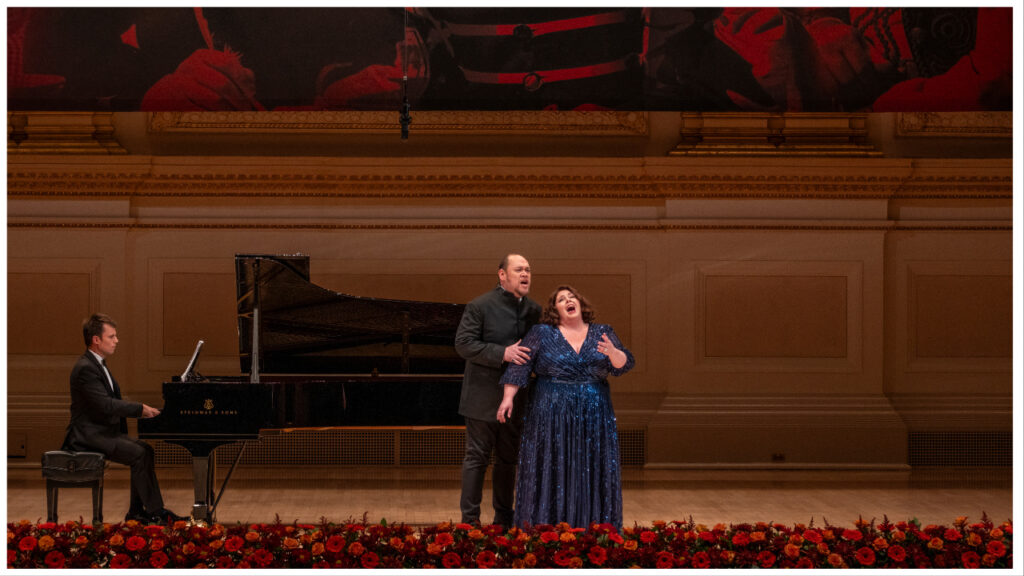
Delightful Duets
First of the duets of the evening was “Pronta io son” from Donizetti’s “Don Pasquale,” sung by Redpath and Plumb. As Plumb laid out the plot against the Don over the swift accompaniment, Redpath’s roulades and sassy bearing saw her as an eager participant of their scheme. The two made a splendid, comedic pair, being well-matched vocally as well as in their gestures as they hammered out the details to a spirited conclusion.
The following duet was “Parigi o cara” from Verdi’s “La Traviata,” sung by Lombardi and Bliss. This tragic number saw them sweetly plan a life that would never be, as Bliss’ assuring phrases were taken up by Lombardi with both affection and delicacy to convey Violetta’s dying state. Splendid singers in their own right, their joint phrases brought the most out of the other’s voice and led into a wonderfully soft conclusion capable of pulling on anyone’s heartstrings.
Next was “Udiste? Come albeggi” from Verdi’s “Il Trovatore,” sung by Kelsey and Meade. The tension between Leonora and the Count di Luna was quickly established through the heavy grind of the accompaniment before leading into more staccato measure. This fierce duet saw Kelsey with dark, simmering tones as he readied for the dual execution of Manrico and Azucena, with Meade attempting to dissuade him by offering herself to the count. This conflict took both their voices to new heights as they seemed to egg each other on, with Meade’s pleas reaching a fervent power as Kelsey sought to deny these efforts.
Last of the duets was “Au fond du temple saint” from Bizet’s “The Pearl Fishers,” sung by Costello and Plumb. As Watkins laid out the light, lapping chords, the vocalists warmly and richly painted their shared memory of love for the same woman, each of their respective vocal qualities helping to shape this vision.
The evening’s concert also saw a number of encores, with the artists sharing selections from beyond the standard opera repertoire. First of these was “Me llaman la primorosa” from the zarzuela “El barber de Sevilla” by composer Gerónimo Giménez, sung by Lombardi. This lighthearted number saw Lombardi deliver a barrage of charming roulades and joyful tones over the whirling accompaniment. Her obbligato with Wagorn also made for a fun dialogue between the artists as they exchanged phrases before the joyful conclusion.
Following this was Costello and Watkins, with the Neapolitan song “Core’ngrata” by Salvatore Cardillo. Riding the passion of the grand, romantic theme, Costello’s rendition suitably ached with the narrator’s longing, bringing forth greater and greater bursts of ardor, which seemed to come naturally and left no space in the air unfilled.
Next was Bliss and Wagorn for Ray Charles’ “Hallelujah I love Her So.” This modern selection made for a wonderful and lighthearted change of mood from much of the program’s grandeur, while sparing little aside from Bliss’ use of a more spoken and natural register in favor of his operatic one.
After this came Perez, singing Manuel Ponce’s “Estrellita.” The lullaby-esque accompaniment was taken up by Perez with remarkable sweetness, her voice letting her effortlessly soar into the highest reaches as she laid out the lines of love and adoration amid sorrow. This quality allowed Perez to deliver breathtaking pianissimos which adorned these phrases with beauty.
Bringing things to a close was Watkins and Kelsey, with “If Ever I would Leave You” from Lerner & Lowe’s “Camelot.” This golden-age musical selection was given with enchanting warmth by Kelsey, whose rendition favored the romantic aspects of Lancelot’s forbidden love. His operatic weight belied a grace which swelled along with his intensity as he painted several scenes around a singular point of love. These qualities made for what was, personally speaking, one of the highlight performances of the evening.
At the end of it all, the audience was treated to a final recording from Richard Tucker, singing “You’ll Never Walk Alone” from Rodgers and Hammerstein’s “Carousel,” leaving us with a timeless message of hope and perseverance in times of hardship. That theme was no doubt explored in full throughout the evening as the artists and foundation made the most of the numerous changes and cutbacks from presentations in previous years.
While it is unfortunate that several artists were unable to make it, as well as the loss of the orchestra, the concert nonetheless delivered all of that which makes the art form so captivating. The vocalists displayed a wealth of artistic sense and interpretation, and pianists Wagorn and Watkins are to be commended for their ability to draw the most of these artists while creating a vivid musical landscape.
Only time will tell whether the recent downturn in funding will continue to hamper the foundation’s ability to provide meaningful training, support, and performance opportunities to future artists, but the fruit of their efforts over the decades was all too plain to hear and enjoy from the roster of extraordinary artists.

